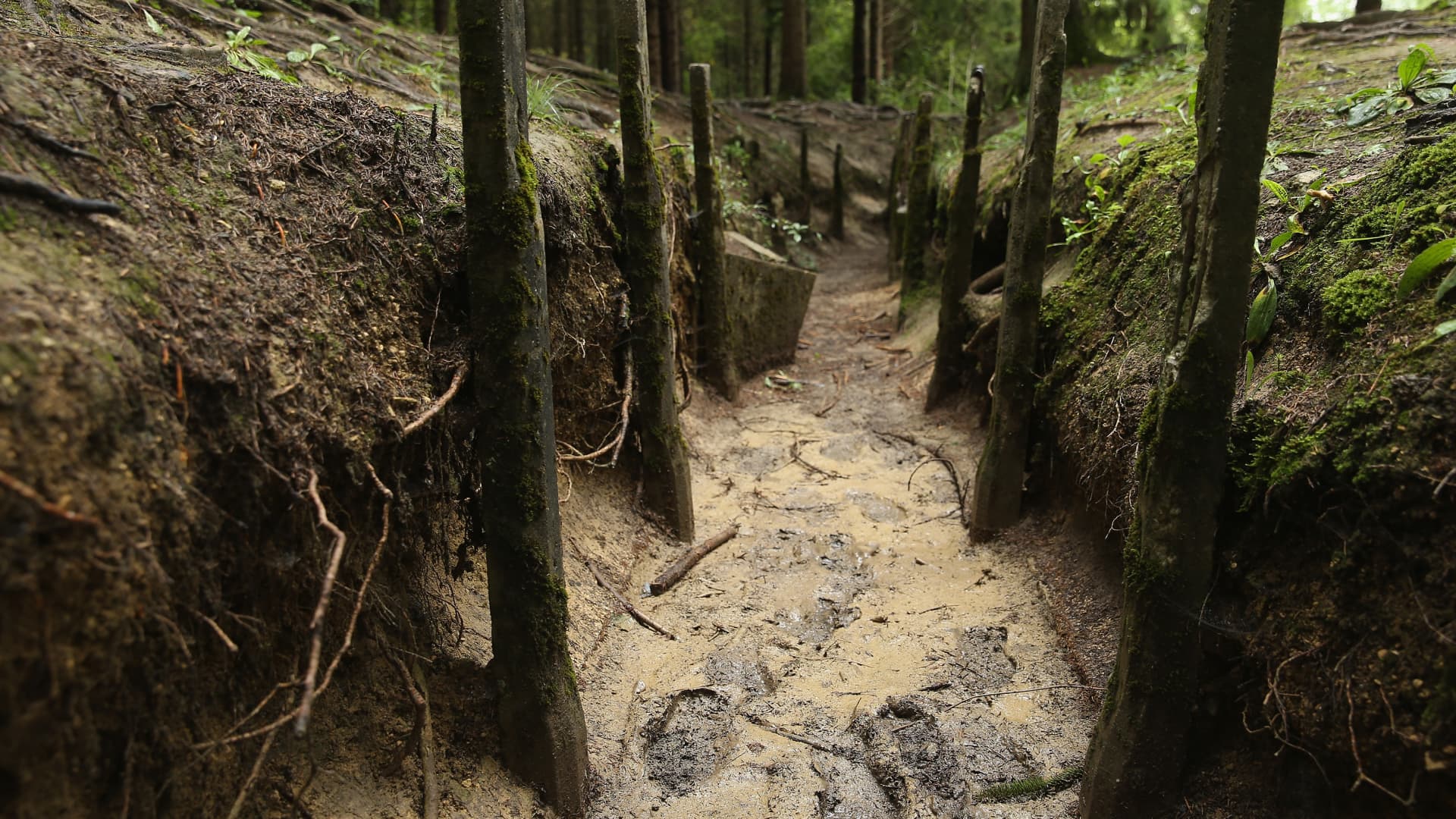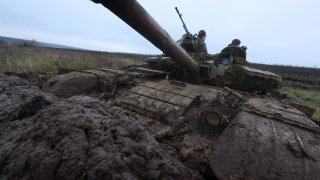
- The sight of trenches, endless mud and mass destruction is reminiscent of World War I, but that's the reality in Ukraine today.
- One ongoing and intense battle in eastern Ukraine has descended into the same bloody trench warfare seen a century ago in northern Europe.
- For several months now, Russian and Ukrainian forces have been fighting for control of the city of Bakhmut.
The sight of trenches, endless mud and mass destruction — with just the stumps of trees emerging from a boggy, churned up landscape — is rightly associated with World War I.
But in Ukraine today, one ongoing and intense battle has descended into the same fierce trench warfare seen a century ago in northern Europe.
For several months now, Russian and Ukrainian forces have been fighting for control of the city of Bakhmut in eastern Ukraine — in what is essentially a key part of a larger battle for control of the Donbas. The Donbas is a region in eastern Ukraine that contains two pro-Russian, so-called republics that Russia says it wants to "liberate."
Get top local stories in Southern California delivered to you every morning. Sign up for NBC LA's News Headlines newsletter.
As the "Battle of Bakhmut" drags on, however, the area has been likened to a "vortex" for both the Ukrainian and Russian forces (of regular units and the state-sanctioned paramilitary organization, the Wagner Group) with both sides suffering what's believed to be heavy casualties with few territorial gains. Both sides have frequently reported the deaths of more than 100 of each others' soldiers per day.
Meanwhile, fighting there has turned the landscape into a mass of mud, trenches and charred trees. The Ukrainian Ministry of Defense tweeted a video of trenches in the area, saying the Ukrainian infantry had been holding the line for several months under heavy fire from Russian forces.
Some analysts have posted images comparing the destruction of the area to the Battle of Verdun in World War I, a bloody and intense battle between French and German forces that lasted from February to December 1916.
One of the longest and fiercest battles during the war, it is also seen as one of the most costly in terms of life; both France and Germany are estimated to have seen hundreds of thousands of casualties each. In the end, the French forces won the battle but it came to symbolize the immense destructiveness and human cost of war.
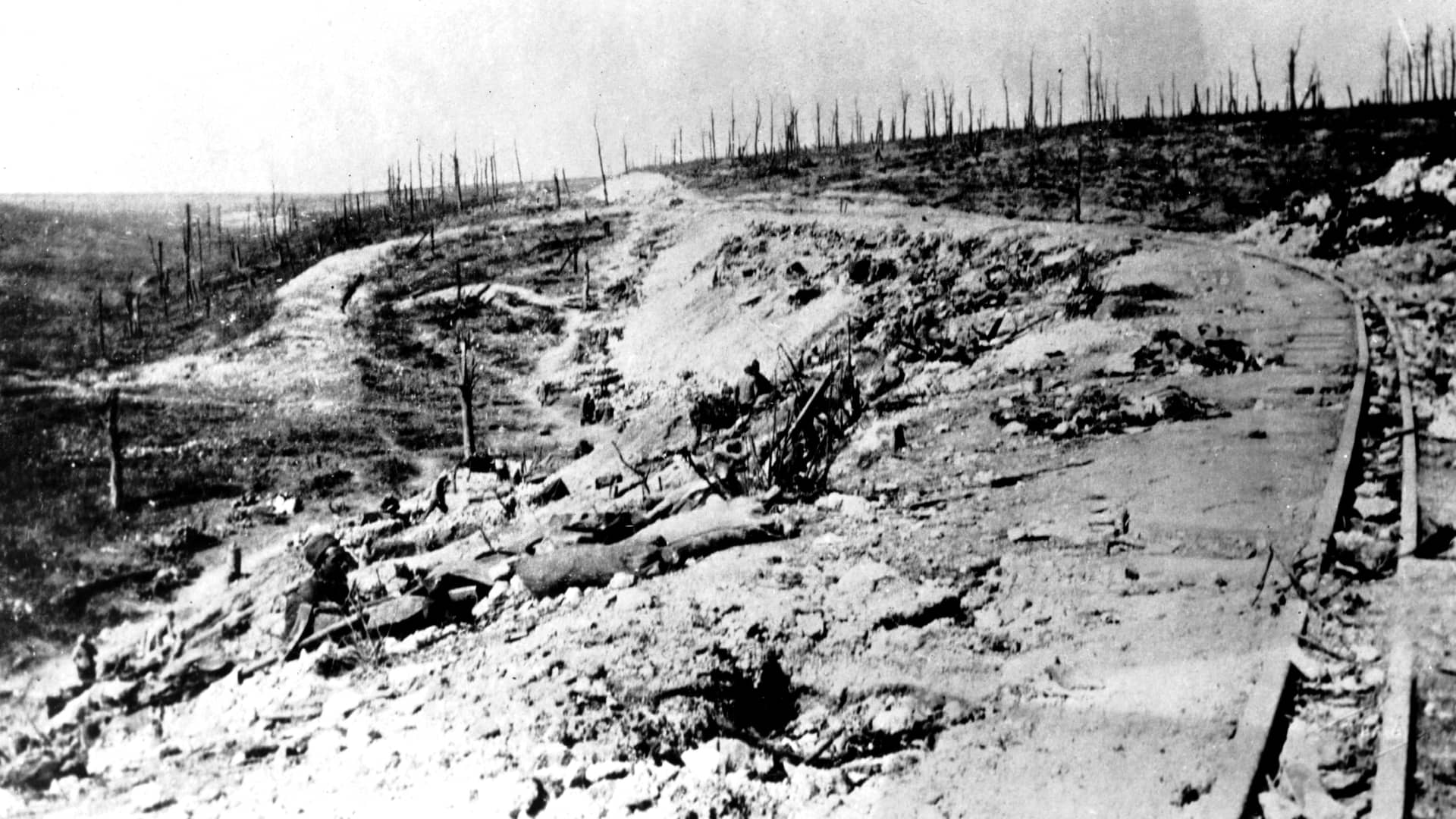
Bakhmut is located on one of the main routes between the cities of Donetsk and Sloviansk in the Donetsk region, an area that makes up part of Ukraine's industrial heartland the Donbas.
Money Report
Seizing the city has become a key strategic aim for Russian forces who believe capturing it would enable them to cut Ukrainian supply lines and allow them to advance toward Ukrainian-controlled Sloviansk and Kramatorsk.
Yuriy Sak, an advisor to Ukraine's defense minister, Oleksiy Reznikov, told CNBC on Wednesday that Bakhmut was the "epicenter of battles" in eastern Ukraine with "very fierce fighting" there. "It's undoubtedly one of the key hotspots at the moment and Bakhmut is very badly destroyed," he said.
He said the city was being compared with Mariupol in southern Ukraine given similar Russian tactics of using a lot of artillery to "raze it to the ground." "It's beginning to look like a ghost city," Sak said.
"The photos and videos from that area are now reminiscent of the landscapes of the First World War ... [there are] burnt trees, trenches, destruction, mountains of corpses of Russian invaders, it is really, really horrendous," he said.
'Very intense'
In recent days, Russia has claimed to have made more advances, with Denis Pushilin, the acting head of the separatist, pro-Russian "Donetsk People's Republic" even suggesting Monday that their forces are about to encircle Bakhmut.
"Our units are moving forward. There are successes directly in the vicinity of Artemovsk [in Russian, the city of Bakhmut is known as Artemovsk]. ... We can say that the situation of the operational encirclement is quite close," he told the Rossiya-24 TV channel, state news agency Tass reported.
Russia's Ministry of Defense said Tuesday that its offensive operations continued in Donetsk and claimed to have "destroyed" 100 Ukrainian servicemen, one tank, five armored combat vehicles and five other vehicles.
For its part, the general staff of Ukraine's armed forces said Wednesday that Russian forces continued to launch offensive operations in the Bakhmut area and surrounding settlements.
Ukrainian Defense Ministry official Sak vehemently denied Russian claims that the city was close to being encircled, saying "there is no question of any Russian encirclement or even semi encirclement."
"This is a fake that is being spread now by the Russian propaganda that is not true. Ukrainian armed forces continue to defend the city, even though it's not easy." He said Russian losses there were "colossal."
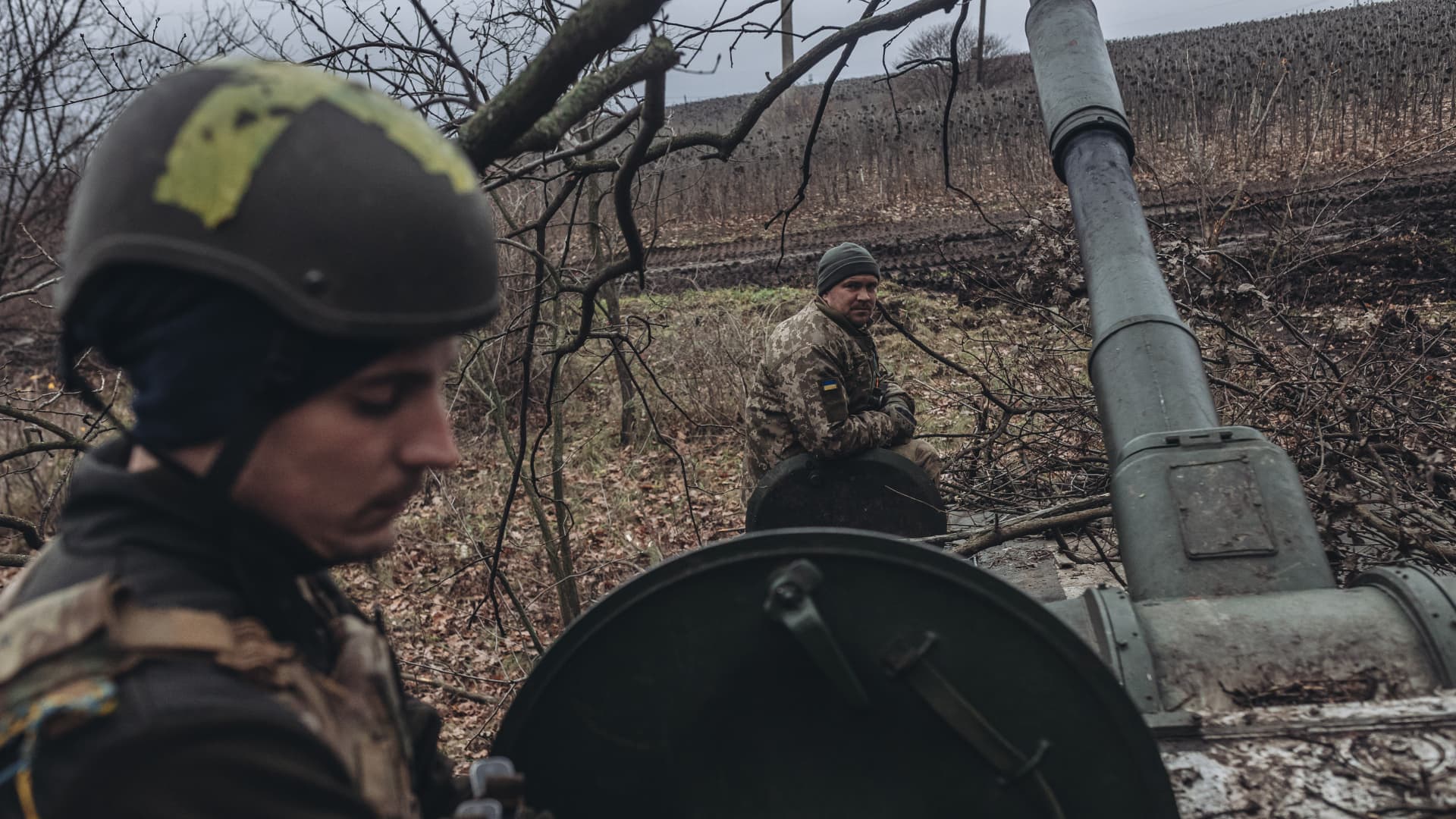
Western analysts accept that Russia is seeing advances around Bakhmut but also deny that it is close to falling into Russian hands.
"Russian forces made marginal gains around Bakhmut on November 29, but Russian forces remain unlikely to have advanced at the tempo that Russian sources claimed," analysts at the Institute for the Study of War said Tuesday.
"ISW remains unable to confirm most other claimed gains around Bakhmut made since November 27. Some Russian milbloggers made unsubstantiated claims that Russian forces broke through the Ukrainian defensive line south of Bakhmut along the T0513 highway ... which would cut one of two remaining main Ukrainian ground lines of communication to Bakhmut, but such claims are likely part of a continuing Russian information operation and are premature."
The institute said it "continues to assess that the degraded Russian forces around Bakhmut are unlikely to place Bakhmut under threat of imminent encirclement rapidly."
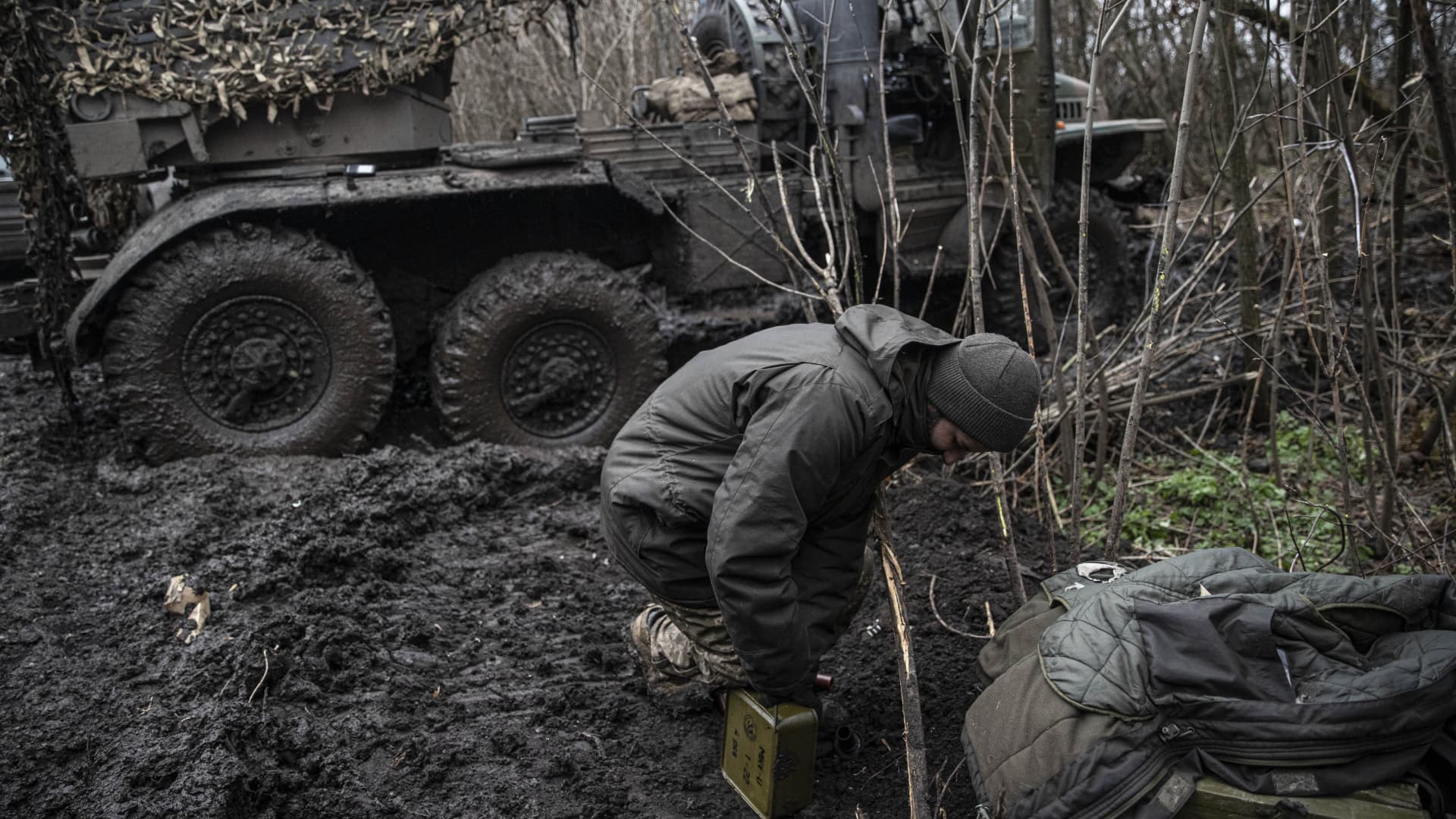
The Battle of Bakhmut is certainly attracting the attention of Ukraine's allies. On Tuesday afternoon at a background briefing, a senior U.S. military official and senior defense official described the fighting in Bakhmut as "very intense."
"Ukrainian offensive around which gained some ground against the Russians, and then a Russian counter-offensive which took that ground back," the military official said, according to the transcript.
"We've seen this back and forth now for weeks between the Russians and the Ukrainians in the vicinity of Bakhmut and really in the Donetsk Oblast [region]," the official continued.
One defense expert told Sky News on Tuesday that Bakhmut was "one place" in Ukraine where Russian forces are making progress.
"The Russians have been pounding away at Bakhmut for about four weeks and they're trying to attack it from the east, the north and it looks as though they've made some progress from the south of Bakhmut," Michael Clarke, professor and former director-general of RUSI, told Sky late Tuesday.
He described the fighting in the area as "very ferocious."
The Battle of Verdun lasted for 10 months in 1916 and the former battlefields are a popular site for visitors interested in World War I. Local farmers in the region and salvage teams still unearth unexploded artillery shells even now. Here's a picture of the trenches in Verdun as they look today:
